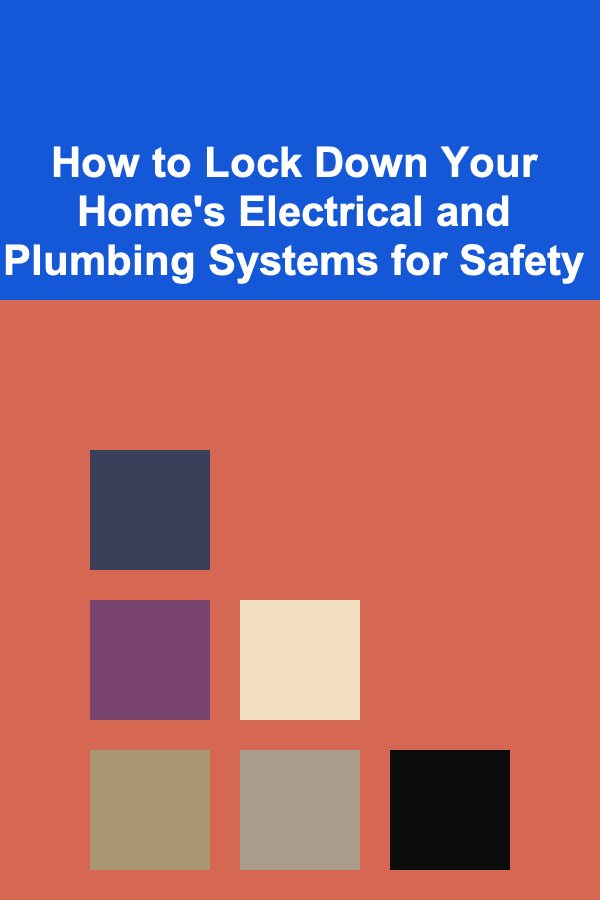
How to Lock Down Your Home's Electrical and Plumbing Systems for Safety
ebook include PDF & Audio bundle (Micro Guide)
$12.99$8.99
Limited Time Offer! Order within the next:

Home security extends far beyond just securing doors and windows. In fact, the heart of a secure and functional home lies in its unseen systems---those systems that keep your house powered, water running, and appliances functioning. Among the most critical of these are the electrical and plumbing systems. When not properly secured, these systems pose significant safety risks, ranging from electrical fires to flooding. A failure in either system can also lead to property damage, health hazards, and even expensive repairs. Therefore, it is essential to understand how to lock down your home's electrical and plumbing systems to protect both your property and your loved ones.
In this article, we will explore comprehensive strategies for securing your home's electrical and plumbing systems. These steps will not only safeguard your house against damage but also ensure that you and your family are safe from potentially disastrous situations. We'll discuss preventive measures, safety protocols, and some critical techniques for locking down both the electrical and plumbing systems in your home.
Securing the Electrical System
Electrical systems are one of the most essential components of a modern home, providing power to lighting, appliances, and devices. However, electrical systems can also be dangerous if not adequately secured. Faulty wiring, improper handling, and lack of safety measures can lead to electrocution, fires, or equipment damage. Below are the strategies you should implement to secure your electrical system:
1. Circuit Breaker Panel Locking
The circuit breaker panel, also known as the fuse box, is one of the most crucial parts of your electrical system. It controls the flow of electricity throughout your home and serves as a safety mechanism by automatically shutting off power in case of overloads or short circuits. However, access to the breaker panel should be limited to ensure that unauthorized individuals (including children or unwelcome visitors) cannot tamper with it.
- Install a Lockable Circuit Breaker Panel: Consider installing a lockable circuit breaker panel that prevents anyone other than authorized individuals from accessing the breakers. Many breaker panels come with a lock option that can be easily activated.
- Label Circuit Breakers: Ensure that all the circuits in the panel are clearly labeled, so if emergency access is required, you can easily identify the right breaker to turn off.
- Childproof the Panel: If you have young children in the house, installing a childproof lock or cover over the circuit breaker panel is essential. This prevents children from opening the panel and potentially causing dangerous electrical mishaps.
2. Electrical Outlet Covers and Safety Caps
Electrical outlets can be a significant hazard if not secured, especially in households with children or pets. To ensure the safety of everyone in the home, electrical outlets should be properly covered.
- Use Outlet Safety Caps: Install safety caps on outlets that are not in use. These caps prevent children from inserting objects into the outlets, reducing the risk of electrical shock.
- Tamper-Resistant Outlets: Consider installing tamper-resistant electrical outlets. These outlets have built-in shutters that only allow electricity to flow when a two-pronged plug is inserted, making it difficult for children to access the openings.
- Cover Exposed Wiring: Any exposed wiring or cords near outlets should be secured with protective covers or channels to prevent accidental contact.
3. Surge Protection
Power surges---often caused by storms, faulty wiring, or sudden electricity fluctuations---can damage sensitive electronic equipment in your home, such as computers, televisions, and refrigerators. Surge protectors are essential to secure your home's electrical system.
- Install Whole-House Surge Protection: A whole-house surge protection system protects all appliances and devices from power surges by diverting excess electricity away from sensitive electronics. This device is usually installed at the electrical panel and is the first line of defense against surges.
- Use Point-of-Use Surge Protectors: For individual devices like computers, televisions, and kitchen appliances, plug them into surge protectors designed to absorb excess voltage. These devices are affordable and can save you from the cost of replacing expensive electronics.
4. Inspect and Upgrade Wiring
Old or deteriorating wiring can be a significant hazard, especially in older homes where the wiring may not meet modern electrical standards. Faulty or outdated wiring is a fire risk and should be regularly inspected.
- Schedule Regular Inspections: Hire a certified electrician to inspect your electrical wiring every few years. This will help identify potential issues like frayed wires, damaged insulation, or outdated systems that might need to be replaced.
- Upgrade Old Wiring: If your home has old, aluminum, or knob-and-tube wiring, consider upgrading to modern copper wiring. Copper wiring is safer and more durable, offering better conductivity and reducing the risk of electrical hazards.
5. Install Motion Sensors and Smart Lighting Systems
Motion sensors and smart lighting systems are excellent for enhancing security by controlling when lights are on or off, helping to conserve energy and adding an extra layer of convenience and protection.
- Use Motion-Sensor Lighting: Install motion sensors in hallways, driveways, and entrances. These systems automatically turn on lights when movement is detected, illuminating the area and deterring intruders.
- Smart Lighting Systems: Smart lighting systems can be programmed to turn on and off at specific times or activated remotely. This is particularly useful if you want to simulate your presence when you are away from home.
Securing the Plumbing System
The plumbing system in your home is just as critical as the electrical system. From providing clean water for daily tasks to ensuring proper waste disposal, the plumbing system must be adequately maintained to prevent water damage, flooding, and health hazards.
1. Shut-off Valves for Water Supply
In case of a plumbing emergency, such as a burst pipe or flooding, the first thing you need to do is stop the flow of water. This can be done by shutting off the main water supply. Knowing how to locate and properly operate the shut-off valve is crucial.
- Know the Location of the Main Shut-off Valve: The main water shut-off valve is usually located near the water meter, either outside your home or in the basement. Make sure every member of the household knows its location and how to turn it off in case of emergency.
- Install Additional Shut-off Valves: Install shut-off valves for key areas, such as under sinks, in the laundry room, and near the water heater. This allows you to isolate specific parts of the plumbing system in case of a localized issue without affecting the entire home's water supply.
2. Water Leak Detectors
Water leaks can cause extensive damage to your home and property. Over time, even small leaks can lead to mold growth, structural damage, and flooding. To prevent such problems, it is essential to monitor and detect leaks early.
- Install Water Leak Sensors: Smart water leak detectors can be placed in high-risk areas, such as under sinks, around toilets, near the water heater, and in the basement. These sensors will alert you if they detect water, allowing you to act quickly before the damage becomes severe.
- Use Smart Plumbers: Some smart water systems allow you to remotely monitor the water usage in your home and detect leaks in real time, making it easier to track down issues before they escalate.
3. Pipe Insulation
Frozen pipes are a common issue in colder climates. When pipes freeze, they can burst, leading to massive water damage and expensive repairs. Insulating pipes is a preventive measure that reduces the risk of freezing during winter months.
- Insulate Vulnerable Pipes: Pipes in unheated areas, such as attics, basements, crawl spaces, and exterior walls, should be insulated with foam sleeves or heating tape. This will keep them warm enough to prevent freezing and bursting.
- Monitor Pipe Conditions: Regularly check for any signs of leaks, cracks, or wear on exposed pipes. If you notice issues, replace or repair the damaged sections promptly.
4. Regular Plumbing Inspections
Much like electrical systems, plumbing systems require routine inspections to identify and address problems before they worsen. Scheduling annual plumbing inspections can save you money in the long run by catching issues early.
- Check for Leaks: Have a plumber inspect all visible pipes for leaks or signs of corrosion, particularly in areas where pipes are old or exposed.
- Evaluate Water Pressure: High water pressure can strain plumbing pipes, potentially leading to bursts or leaks. A plumber can test your water pressure and make adjustments as necessary to ensure it is within a safe range.
5. Backflow Prevention
Backflow occurs when contaminated water flows backward into the clean water supply, potentially introducing harmful bacteria and chemicals. Installing a backflow prevention system is vital for protecting your home's water supply.
- Install Backflow Valves: Backflow valves prevent contaminated water from flowing back into the drinking water supply. These devices should be installed in areas such as irrigation systems, septic systems, and water treatment equipment to ensure the water supply remains uncontaminated.
Conclusion
Securing the electrical and plumbing systems in your home is essential for maintaining a safe and functional living environment. By locking down these systems---through preventive measures, upgrades, and regular maintenance---you can protect your home from potential hazards such as electrical fires, plumbing disasters, and expensive repairs. From simple tasks like locking the circuit breaker panel to implementing advanced systems such as smart water leak detectors and backflow prevention, every step you take will help ensure your home remains secure. Remember, home safety isn't just about protecting your valuables---it's about creating a secure, risk-free environment for you and your loved ones.

How to Manage Passwords Safely with a Password Manager
Read More
How to Maximize Small Patios for Entertaining
Read More
How to Organize Storage Areas for a Neat Appearance
Read More
How to Sell Digital Products Successfully for Web Developers: A Comprehensive Guide
Read More
How to Understand and Use Asset Allocation to Reduce Risk
Read More
The IT Support Specialist's Playbook: Essential Tools for Efficient IT Support
Read MoreOther Products

How to Manage Passwords Safely with a Password Manager
Read More
How to Maximize Small Patios for Entertaining
Read More
How to Organize Storage Areas for a Neat Appearance
Read More
How to Sell Digital Products Successfully for Web Developers: A Comprehensive Guide
Read More
How to Understand and Use Asset Allocation to Reduce Risk
Read More